外研版(2019)必修第三册 Unit6 Disaster and hope Using language公开课课件(共31张PPT)
文档属性
| 名称 | 外研版(2019)必修第三册 Unit6 Disaster and hope Using language公开课课件(共31张PPT) | 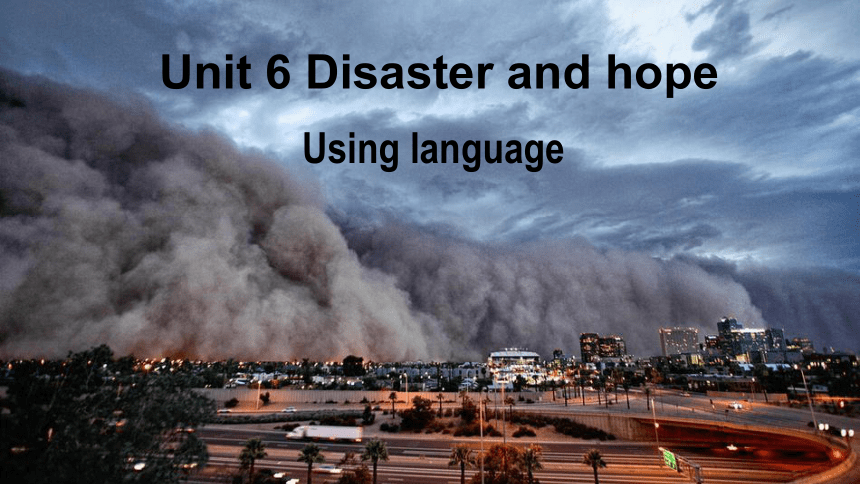 | |
| 格式 | pptx | ||
| 文件大小 | 1.7MB | ||
| 资源类型 | 教案 | ||
| 版本资源 | 外研版(2019) | ||
| 科目 | 英语 | ||
| 更新时间 | 2023-03-02 07:31:45 | ||
图片预览

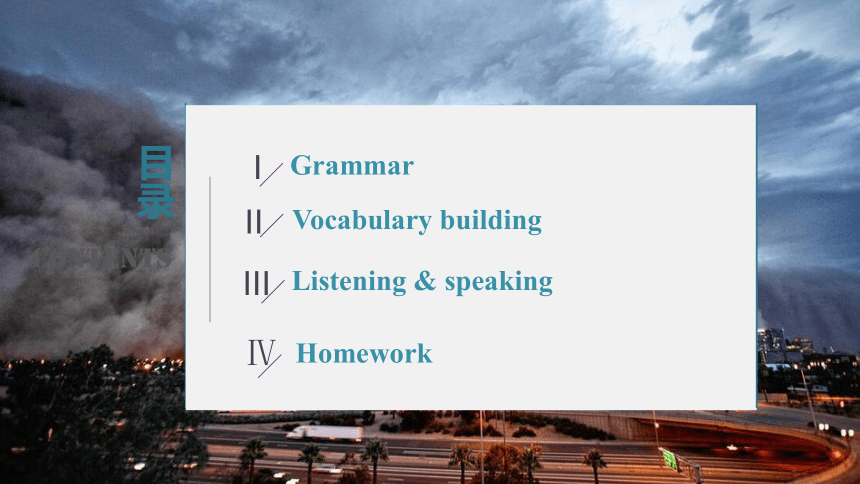
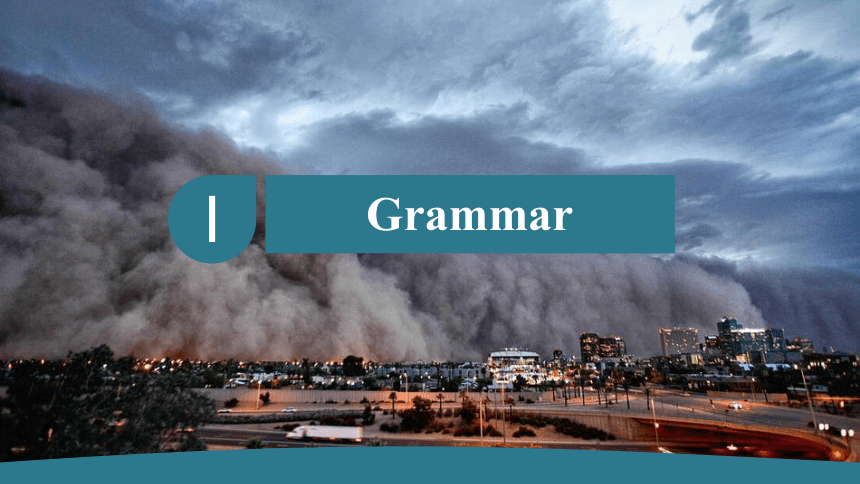
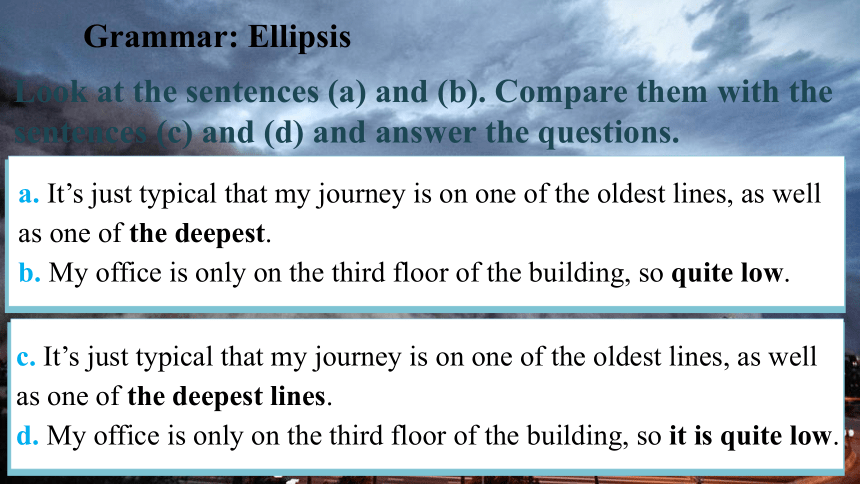
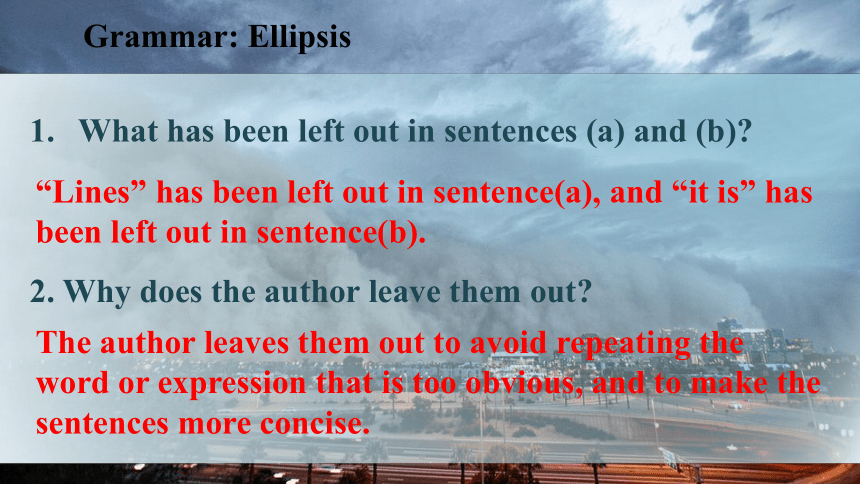
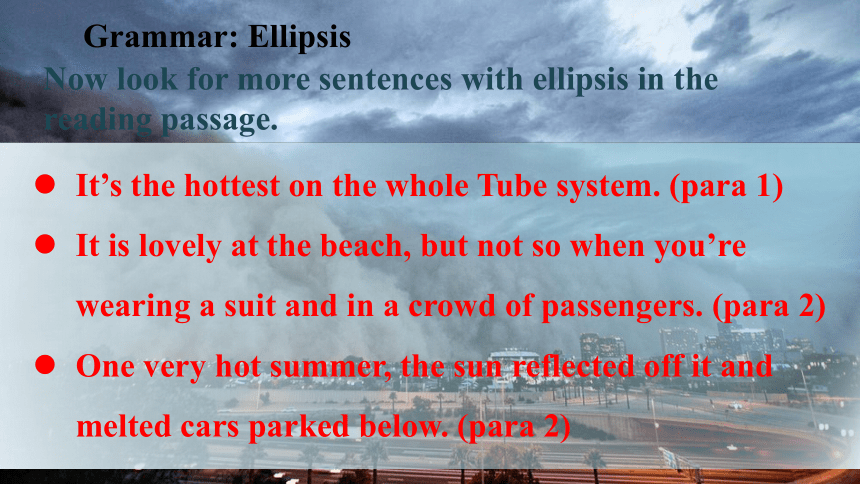
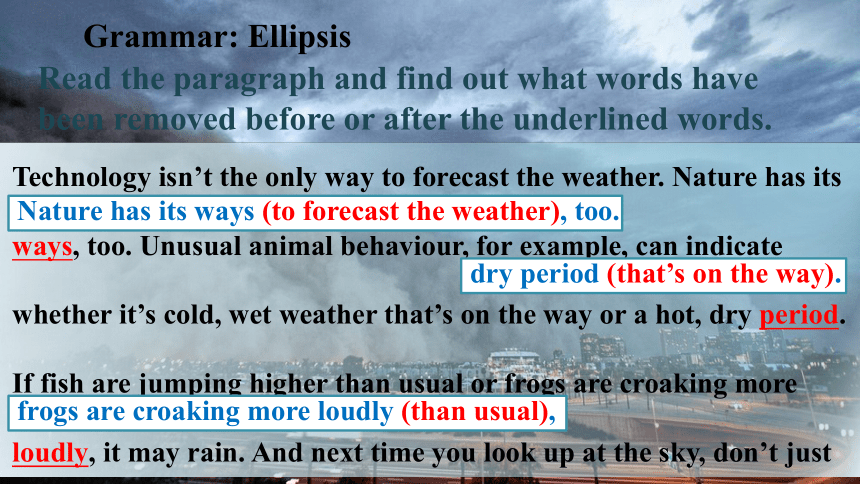
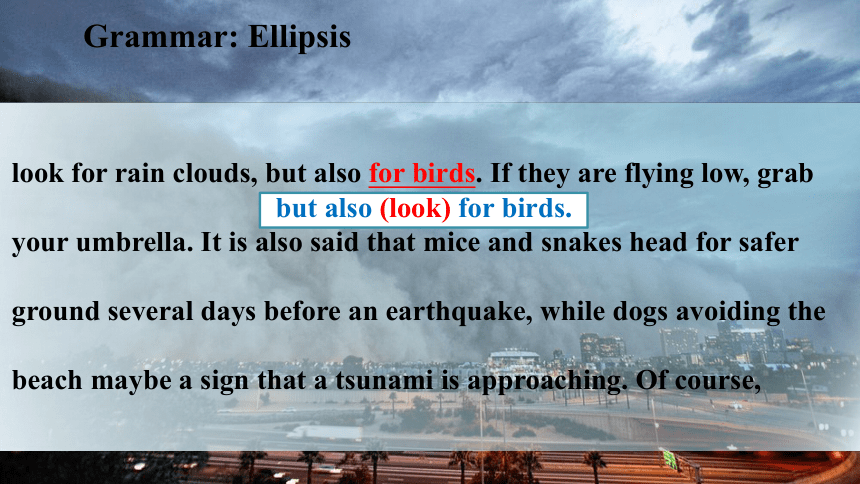
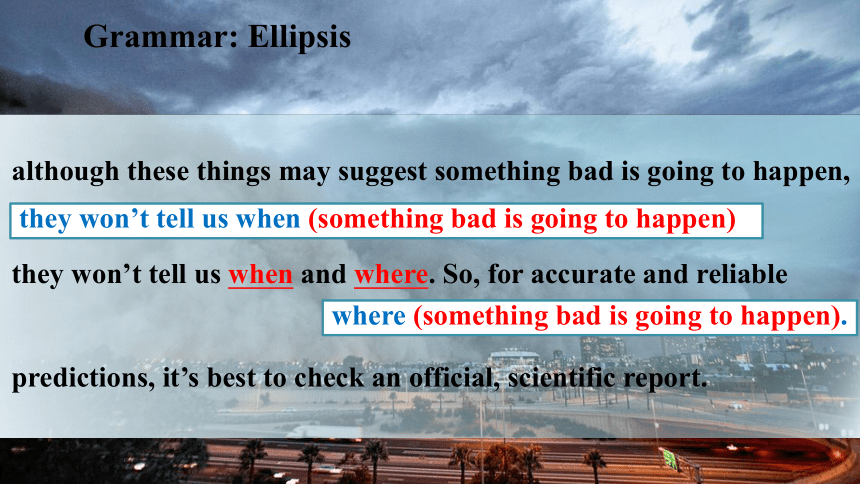
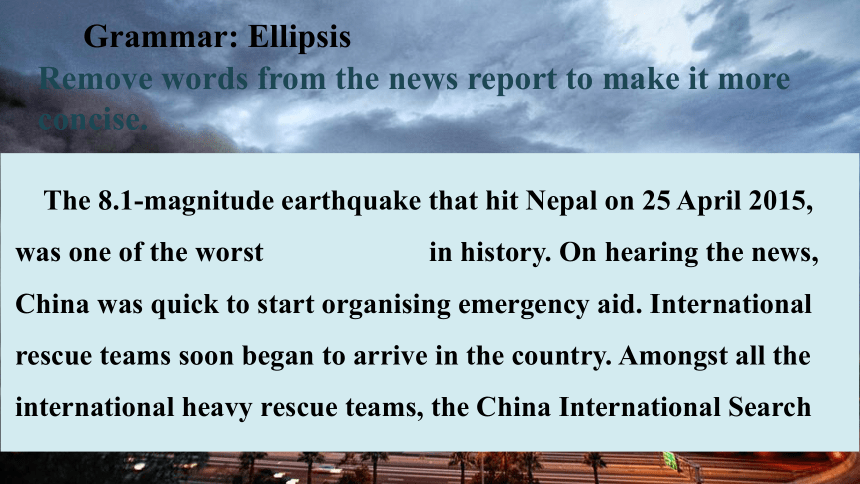
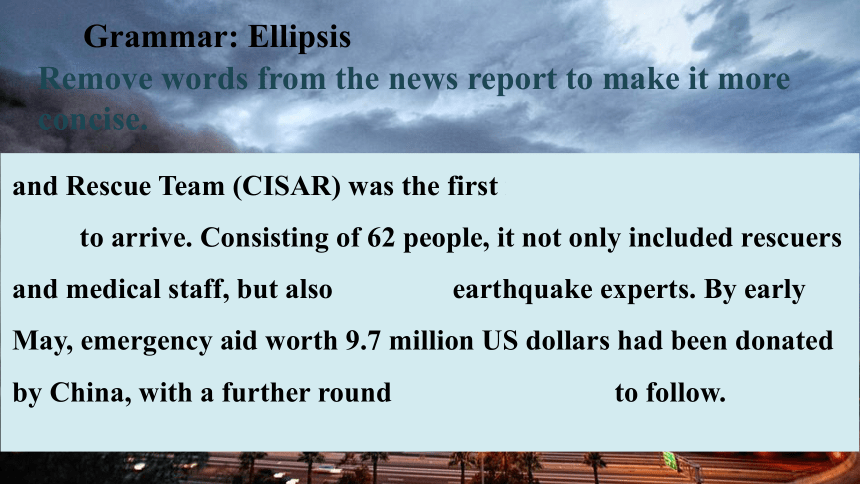
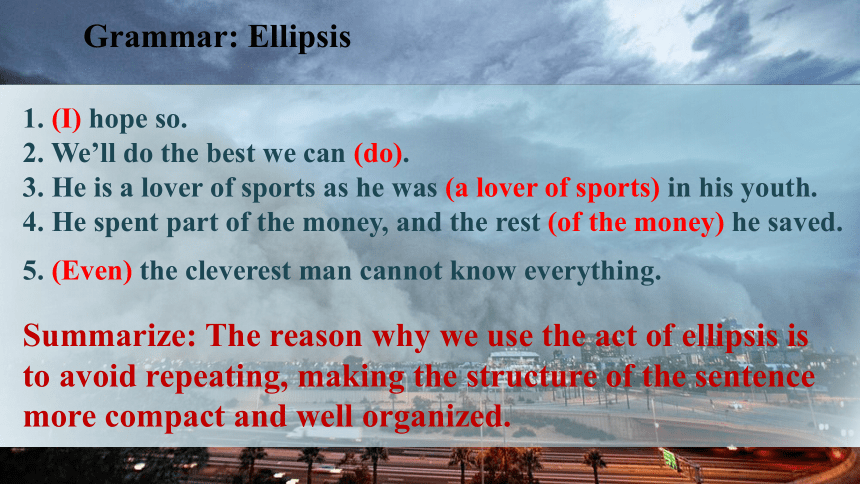
文档简介
(共31张PPT)
Using language
Unit 6 Disaster and hope
目录
contents
Grammar
Vocabulary building
Listening & speaking
Homework
I
II
III
Ⅳ
I
Grammar
Look at the sentences (a) and (pare them with the sentences (c) and (d) and answer the questions.
0,000 people reading my blog! b I love to photograph the rising sun, …
a. It’s just typical that my journey is on one of the oldest lines, as well as one of the deepest.
b. My office is only on the third floor of the building, so quite low.
Grammar: Ellipsis
0,000 people reading my blog! b I love to photograph the rising sun, …
c. It’s just typical that my journey is on one of the oldest lines, as well as one of the deepest lines.
d. My office is only on the third floor of the building, so it is quite low.
What has been left out in sentences (a) and (b)
2. Why does the author leave them out
“Lines” has been left out in sentence(a), and “it is” has been left out in sentence(b).
Grammar: Ellipsis
The author leaves them out to avoid repeating the word or expression that is too obvious, and to make the sentences more concise.
Now look for more sentences with ellipsis in the reading passage.
It’s the hottest on the whole Tube system. (para 1)
It is lovely at the beach, but not so when you’re wearing a suit and in a crowd of passengers. (para 2)
One very hot summer, the sun reflected off it and melted cars parked below. (para 2)
Grammar: Ellipsis
Grammar: Ellipsis
Technology isn’t the only way to forecast the weather. Nature has its ways, too. Unusual animal behaviour, for example, can indicate whether it’s cold, wet weather that’s on the way or a hot, dry period. If fish are jumping higher than usual or frogs are croaking more loudly, it may rain. And next time you look up at the sky, don’t just
Read the paragraph and find out what words have been removed before or after the underlined words.
Nature has its ways (to forecast the weather), too.
dry period (that’s on the way).
frogs are croaking more loudly (than usual),
Grammar: Ellipsis
look for rain clouds, but also for birds. If they are flying low, grab your umbrella. It is also said that mice and snakes head for safer ground several days before an earthquake, while dogs avoiding the beach maybe a sign that a tsunami is approaching. Of course,
but also (look) for birds.
Grammar: Ellipsis
although these things may suggest something bad is going to happen, they won’t tell us when and where. So, for accurate and reliable predictions, it’s best to check an official, scientific report.
they won’t tell us when (something bad is going to happen)
where (something bad is going to happen).
Grammar: Ellipsis
The 8.1-magnitude earthquake that hit Nepal on 25 April 2015, was one of the worst earthquakes in history. On hearing the news, China was quick to start organising emergency aid. International rescue teams soon began to arrive in the country. Amongst all the international heavy rescue teams, the China International Search
Remove words from the news report to make it more concise.
Grammar: Ellipsis
and Rescue Team (CISAR) was the first international heavy rescue team to arrive. Consisting of 62 people, it not only included rescuers and medical staff, but also included earthquake experts. By early May, emergency aid worth 9.7 million US dollars had been donated by China, with a further round of emergency aid to follow.
Remove words from the news report to make it more concise.
Grammar: Ellipsis
Summarize: The reason why we use the act of ellipsis is to avoid repeating, making the structure of the sentence more compact and well organized.
1. (I) hope so.
2. We’ll do the best we can (do).
3. He is a lover of sports as he was (a lover of sports) in his youth.
4. He spent part of the money, and the rest (of the money) he saved.
5. (Even) the cleverest man cannot know everything.
II
Vocabulary building
Look at the pictures and answer the questions.
Vocabulary building: Words about disasters
wildfire
drought
typhoon
earthquake
blizzard
tsunami
avalanche
Vocabulary building: Words about disasters
1. Which one do you think is the most dangerous
As far as I am concerned, earthquake is the most dangerous disaster, which can leave lots of people homeless.
Vocabulary building: Words about disasters
2004, Tsunami in Indonesia;
2008, Wenchuan earthquake;
2019-2020, Australian wildfire.
2. Can you name some big natural disasters in history
Vocabulary building: Words about disasters
Complete the reports with the words in Activity 4. Pay attention to the words describing natural disasters.
In 1881, a(n) 1 _________ struck the small Vietnamese city of Haiphong, bringing terrible strong winds. When it hit the coast, huge tidal waves caused severe flood, costing the lives of up to 300,000 citizens.
typhoon
In August 1949, the Landes region of South-west France faced a major 2 ________ that lasted almost a week. Some 500 km2 of forested land was burnt and 82 people killed. Even today, it is considered one of Europe’s most deadly forest fires.
wildfire
Vocabulary building: Words about disasters
The winter of 1950 to 1951 came to be known as the Winter of Terror when over 600 3 ___________ struck towns and villages in the mountains of the Swiss-Austrian Alps. Caused by exceptionally heavy snowfall within a short period of time, they destroyed buildings and forests, and claimed over 256 lives.
avalanches
In 1960, Chile suffered the strongest 4 ___________ to be recorded in the 20th century. The shock is generally agreed to have had a magnitude of 9.5. It caused a(n) 5 ________ with waves of up to 25 metres affecting places as far away as Hawaii and Japan.
earthquake
tsunami
Vocabulary building: Words about disasters
A(n) 6 ________ hit Iran in February 1972, causing a week of extremely low temperatures. Winter storms brought as much as 7.9 metres of snow in the south of the country, resulting in the deaths of about 4,000 people.
blizzard
In July 2011, a(n) 7 ________ struck East Africa. It was said to be the worst in 60 years, and not a single drop of rain fell for almost a whole year. It led to a severe food crisis and threatened the livelihoods of more than 9.5 million people.
drought
Work in pairs. Talk about a recent natural disaster you have heard about or seen on the news.
Vocabulary building: Words about disasters
Useful expressions:
Have you heard the news about ...
How long have ... lasted
What’s the effect of ...
How do you think we should cope with ...
How has the weather changed ...
III
Listening & speaking
Listening & speaking: Before listening
For thousands of years, people have been trying to predict the weather. In China during the Shang Dynasty, people recorded weather forecasts on animal bones and tortoise shells. Centuries later, in Greece, the philosopher, Aristotle wrote his theories about how weather conditions formed. Weather forecasting advanced over time, with more and more instruments to measure temperature, humidity and air pressure. Today, satellite data and computer technology help scientists predict the weather more precisely.
Did you know
Listening & speaking: While-listening
Listen to the weather forecast and match the weather symbols to the locations on the map.
Listening & speaking: While-listening
Now talk about how the speaker describes the weather. Listen again if necessary.
Learning to learn
When listening to a weather forecast, pay attention to the following information:
temperature levels
descriptions of forthcoming weather conditions
weather warnings
Listening & speaking: While-listening
Listen again and complete the form.
Anchorage
Phoenix
You will need 1 ______________.
Temperatures will stay around 2 ______℃.
Temperatures are really high and it’s probably hot enough to 3 ____________________.
Be sure to 4 ____________________ if you or others have symptoms of heatstroke.
warm clothes
-15
fry meat on the road
get medical attention
Listening & speaking: While-listening
Houston
Washington, DC
It’s 5 _________ season and there will be a big one across the Atlantic.
Stay 6 _____________ and listen out for the latest forecasts.
Temperatures are going to stay around 7 ____℃.
Don’t drive 8 ___________________!
hurricane
safe indoors
13
through floodwaters
Listening & speaking: While-listening
San Francisco
Temperatures are going to be around 9 _____℃.
People are suffering from 10 ________, which are causing damage and loss.
25
wildfires
Listening & speaking: Pair work
Work in pairs. Act out the conversation to talk about an extreme weather condition.
Student A: Turn to Page 83.
Student B: Turn to Page 86.
Listening & speaking: Pair work
Useful Expressions:
I’m calling to check that ...
How long have ... lasted
What’s the effect of ...
How do you cope with ...
Is there anything I can do to ...
How has the weather changed ...
IV
Homework
Homework
Choose another extreme weather condition and have a similar conversation.
Using language
Unit 6 Disaster and hope
目录
contents
Grammar
Vocabulary building
Listening & speaking
Homework
I
II
III
Ⅳ
I
Grammar
Look at the sentences (a) and (pare them with the sentences (c) and (d) and answer the questions.
0,000 people reading my blog! b I love to photograph the rising sun, …
a. It’s just typical that my journey is on one of the oldest lines, as well as one of the deepest.
b. My office is only on the third floor of the building, so quite low.
Grammar: Ellipsis
0,000 people reading my blog! b I love to photograph the rising sun, …
c. It’s just typical that my journey is on one of the oldest lines, as well as one of the deepest lines.
d. My office is only on the third floor of the building, so it is quite low.
What has been left out in sentences (a) and (b)
2. Why does the author leave them out
“Lines” has been left out in sentence(a), and “it is” has been left out in sentence(b).
Grammar: Ellipsis
The author leaves them out to avoid repeating the word or expression that is too obvious, and to make the sentences more concise.
Now look for more sentences with ellipsis in the reading passage.
It’s the hottest on the whole Tube system. (para 1)
It is lovely at the beach, but not so when you’re wearing a suit and in a crowd of passengers. (para 2)
One very hot summer, the sun reflected off it and melted cars parked below. (para 2)
Grammar: Ellipsis
Grammar: Ellipsis
Technology isn’t the only way to forecast the weather. Nature has its ways, too. Unusual animal behaviour, for example, can indicate whether it’s cold, wet weather that’s on the way or a hot, dry period. If fish are jumping higher than usual or frogs are croaking more loudly, it may rain. And next time you look up at the sky, don’t just
Read the paragraph and find out what words have been removed before or after the underlined words.
Nature has its ways (to forecast the weather), too.
dry period (that’s on the way).
frogs are croaking more loudly (than usual),
Grammar: Ellipsis
look for rain clouds, but also for birds. If they are flying low, grab your umbrella. It is also said that mice and snakes head for safer ground several days before an earthquake, while dogs avoiding the beach maybe a sign that a tsunami is approaching. Of course,
but also (look) for birds.
Grammar: Ellipsis
although these things may suggest something bad is going to happen, they won’t tell us when and where. So, for accurate and reliable predictions, it’s best to check an official, scientific report.
they won’t tell us when (something bad is going to happen)
where (something bad is going to happen).
Grammar: Ellipsis
The 8.1-magnitude earthquake that hit Nepal on 25 April 2015, was one of the worst earthquakes in history. On hearing the news, China was quick to start organising emergency aid. International rescue teams soon began to arrive in the country. Amongst all the international heavy rescue teams, the China International Search
Remove words from the news report to make it more concise.
Grammar: Ellipsis
and Rescue Team (CISAR) was the first international heavy rescue team to arrive. Consisting of 62 people, it not only included rescuers and medical staff, but also included earthquake experts. By early May, emergency aid worth 9.7 million US dollars had been donated by China, with a further round of emergency aid to follow.
Remove words from the news report to make it more concise.
Grammar: Ellipsis
Summarize: The reason why we use the act of ellipsis is to avoid repeating, making the structure of the sentence more compact and well organized.
1. (I) hope so.
2. We’ll do the best we can (do).
3. He is a lover of sports as he was (a lover of sports) in his youth.
4. He spent part of the money, and the rest (of the money) he saved.
5. (Even) the cleverest man cannot know everything.
II
Vocabulary building
Look at the pictures and answer the questions.
Vocabulary building: Words about disasters
wildfire
drought
typhoon
earthquake
blizzard
tsunami
avalanche
Vocabulary building: Words about disasters
1. Which one do you think is the most dangerous
As far as I am concerned, earthquake is the most dangerous disaster, which can leave lots of people homeless.
Vocabulary building: Words about disasters
2004, Tsunami in Indonesia;
2008, Wenchuan earthquake;
2019-2020, Australian wildfire.
2. Can you name some big natural disasters in history
Vocabulary building: Words about disasters
Complete the reports with the words in Activity 4. Pay attention to the words describing natural disasters.
In 1881, a(n) 1 _________ struck the small Vietnamese city of Haiphong, bringing terrible strong winds. When it hit the coast, huge tidal waves caused severe flood, costing the lives of up to 300,000 citizens.
typhoon
In August 1949, the Landes region of South-west France faced a major 2 ________ that lasted almost a week. Some 500 km2 of forested land was burnt and 82 people killed. Even today, it is considered one of Europe’s most deadly forest fires.
wildfire
Vocabulary building: Words about disasters
The winter of 1950 to 1951 came to be known as the Winter of Terror when over 600 3 ___________ struck towns and villages in the mountains of the Swiss-Austrian Alps. Caused by exceptionally heavy snowfall within a short period of time, they destroyed buildings and forests, and claimed over 256 lives.
avalanches
In 1960, Chile suffered the strongest 4 ___________ to be recorded in the 20th century. The shock is generally agreed to have had a magnitude of 9.5. It caused a(n) 5 ________ with waves of up to 25 metres affecting places as far away as Hawaii and Japan.
earthquake
tsunami
Vocabulary building: Words about disasters
A(n) 6 ________ hit Iran in February 1972, causing a week of extremely low temperatures. Winter storms brought as much as 7.9 metres of snow in the south of the country, resulting in the deaths of about 4,000 people.
blizzard
In July 2011, a(n) 7 ________ struck East Africa. It was said to be the worst in 60 years, and not a single drop of rain fell for almost a whole year. It led to a severe food crisis and threatened the livelihoods of more than 9.5 million people.
drought
Work in pairs. Talk about a recent natural disaster you have heard about or seen on the news.
Vocabulary building: Words about disasters
Useful expressions:
Have you heard the news about ...
How long have ... lasted
What’s the effect of ...
How do you think we should cope with ...
How has the weather changed ...
III
Listening & speaking
Listening & speaking: Before listening
For thousands of years, people have been trying to predict the weather. In China during the Shang Dynasty, people recorded weather forecasts on animal bones and tortoise shells. Centuries later, in Greece, the philosopher, Aristotle wrote his theories about how weather conditions formed. Weather forecasting advanced over time, with more and more instruments to measure temperature, humidity and air pressure. Today, satellite data and computer technology help scientists predict the weather more precisely.
Did you know
Listening & speaking: While-listening
Listen to the weather forecast and match the weather symbols to the locations on the map.
Listening & speaking: While-listening
Now talk about how the speaker describes the weather. Listen again if necessary.
Learning to learn
When listening to a weather forecast, pay attention to the following information:
temperature levels
descriptions of forthcoming weather conditions
weather warnings
Listening & speaking: While-listening
Listen again and complete the form.
Anchorage
Phoenix
You will need 1 ______________.
Temperatures will stay around 2 ______℃.
Temperatures are really high and it’s probably hot enough to 3 ____________________.
Be sure to 4 ____________________ if you or others have symptoms of heatstroke.
warm clothes
-15
fry meat on the road
get medical attention
Listening & speaking: While-listening
Houston
Washington, DC
It’s 5 _________ season and there will be a big one across the Atlantic.
Stay 6 _____________ and listen out for the latest forecasts.
Temperatures are going to stay around 7 ____℃.
Don’t drive 8 ___________________!
hurricane
safe indoors
13
through floodwaters
Listening & speaking: While-listening
San Francisco
Temperatures are going to be around 9 _____℃.
People are suffering from 10 ________, which are causing damage and loss.
25
wildfires
Listening & speaking: Pair work
Work in pairs. Act out the conversation to talk about an extreme weather condition.
Student A: Turn to Page 83.
Student B: Turn to Page 86.
Listening & speaking: Pair work
Useful Expressions:
I’m calling to check that ...
How long have ... lasted
What’s the effect of ...
How do you cope with ...
Is there anything I can do to ...
How has the weather changed ...
IV
Homework
Homework
Choose another extreme weather condition and have a similar conversation.
